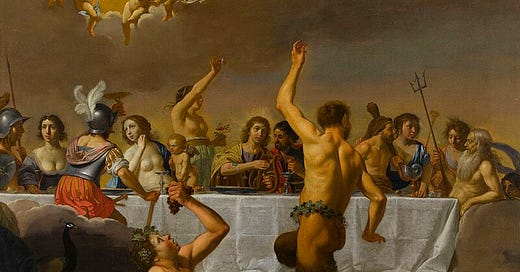The fact that the 2024 Olympics has managed to generate any buzz in today’s wildly competitive attention-economy is quite the impressive feat…especially considering how banal it’s become over the last few years. What was once a celebration of athletic skill and discipline has been reduced to another occasion for an exchange in the culture war.
In an unsurprisingly Baudrillardian turn of events, little of the internet discourse over the Olympics has anything to do with the athletic competition itself. Take the controversy over the opening ceremony: Some bemoaned it as a blasphemous rendition of the Last Supper, others fired back that it was actually a tableau vivant of Jan van Bijlert’s 1635 painting The Feast of the Gods…while a painfully cringe faction applauded it as a display of “LGBTQ+ visibility.”
Though I felt at home in none of these camps, I’d argue that the second one is most worthy of our attention. The Olympics traces its roots to Greece’s classical pagan era, which manifested in both pursuits of virtue (like the Olympics) and debauchery (bacchanals). And who better to turn to in order to understand this tension than Camille Paglia?
In her 700-page tome Sexual Personae, she investigates the way Oscar Wilde’s work was influenced by his fascination with classical Greece, and how the forces of Apollonian aestheticism, Dionysian decadence, and Christian charity warred within his soul. Paying close attention to works such as The Importance of Being Earnest, Paglia investigates how Wilde’s “homosexual worship of beauty,” which “provided him with the master image of the articulated male body, with its radical sexual externality,” appeared in his work. She insists that one can clearly identify in his writings the various shifts in his relationship with male beauty, from phases of more stoic, detached appreciation of the male form, to moments of sexual indulgence, and his turn toward chastity during his final years.
Among the Olympics content I was barraged with on my feeds were embarrassingly infantile posts fawning over several “distractingly gorgeous” athletes. A slew of Olympian thirst-trap memes made their way around social media platforms, with “Gay Twitter” being the worst offender. Perhaps what scandalizes me most about the 2024 Olympics is not its blasphemy or immorality, but how it highlights the dreadful impoverishment of our collective imagination. At least the self-indulgence of the ancient Greeks and figures like Wilde was enshrouded in an aesthetically rich, cosmically charged ethos. In our age of simulations, we’ve lost any sense of grandeur, so much so that even expressions of lust have become boring and predictable.
This Week in Compact
LinkedIn founder Reid Hoffman has announced his support for Kamala Harris…but with a few conditions. Matt Stoller argues that the Harris, who is “still sketching out her views,” as it a crossroads in her campaign: She’ll need to choose between continuing Biden agenda on trade and corporate power (and backing trustbusters like Lina Khan), or siding with the interests of corporate funders like Hoffman in the style of Hillary Clinton. And check out the team’s discussion of Stoller’s question on this week’s podcast episode.
As Democrats ramp up their criticisms of J.D. Vance, citing his “shape-shifting” turn toward Trump and offensive comments about childless women, Batya Ungar-Sargon argues that what really offends both Democrats and neoconservatives is that he’s “a class traitor. His views are no longer those of a young, ambitious man who took advantage of the meritocracy and saw the world through the individualist fiction it enshrines. They are the views of a mature adult, a father, a man who takes a more communal view.”
Leila Mechoui reviewed the much talked-about What Are Children For? by Anastasia Berg and Rachel Wiseman, acknowledging the “nuance and sophistication of the answer provided by the authors to their titular question,” but expressing concern that “the book is unlikely to counteract the anti-natalism that is becoming a default setting across much of the world.”
Elsewhere on the natalist front, Michael Toscano reveals that “when you work on marriage and family issues, you learn who on Capitol Hill is anti-family, who is pro-family in name only, and who will rise to the occasion, rebuff the lobbyists, and vote for policies that make it easier to get married, have kids, and raise them.” Though people in the latter group of hard to come by, Toscano says, Vance is one of them: “Vance has broken with this reigning sentiment, and his genuine support for family policy—shared by several other notably younger Republicans in the senate—is part of an epochal change within the party.”
Hamilton Craig laments “the issue polarization that is essential to party politics requires the Republicans to cede green industrial policy to the Democrats,” despite the fact that “Republican voters have already benefited from the promotion of green tech domestically.” He calls for the GOP to “shed this taboo” against Electric Vehicles and to “seize the future of energy and manufacturing for America.”
As the left ramps up its conspiratorial musings on all things Trump related, Michael Cuenco offered a historical perspective on the allure that conspiracy theories and “misinformation” has held over Americans. “Long before the internet, such narratives circulated in pamphlets and broadsides—including the nation’s founding document, the Declaration of Independence.”
Valerie Stivers reviewed Joy Williams’s new book Concerning the Future of Souls, which explores “the terrain of the afterlife” and “the final judgment of humankind.” Despite her “reservations about some of Williams’s premises,” Stivers insists that Williams “is one of our greatest living writers, renowned especially as a master of the short story.”
Closing out the week, Adam Lehrer takes a deep dive into the “carefully cultivated” public image of “the BBC’s favorite enfant terrible,” Nick Cave.
And be sure to check out the latest episode of Blame Theory featuring David Dudrick on the misunderstandings around Foucault’s History of Sexuality, and Sohrab’s newsletter on Kamala Harris’s “based old-left” father.
Reimagining the gender wars
I must admit to feeling there’s a major lacuna in these debates about natalism. Regardless of one’s ideological persuasion, most tend to enter into them with the presupposition that women’s capacity to bear children makes them vulnerable—which progressives paint in a negative light, and the more traditionally minded claim is a source of virtue. What’s missing here is the psychoanalytic trope—taken up by the likes of Freud, Jung, and Neumann—that the mother is characterized not by her vulnerability but by her power.
Certainly, this only holds if we look at women less from a socioeconomic or moral point of view and more from a naturalistic one. The idea of the Great Mother, from whose grasp man is perpetually trying to escape, appears often in Paglia’s scholarly work and popular punditry. Those who complain of women’s victimization under patriarchal oppression often fail to recognize women’s “complex,” intuitive intelligence when it comes to relationships, compared to men’s “simplicity,” she says in Sexual Personae. “The women dictate the structure and pace of relationship. The men think they act on their own, but they are always preceded and foreseen.” One can recognize these dynamics at work, she argues, as much in the works of Homer, Wilde, and Austen as in our own lived experience today.
Similarly, Compact contributing editor Slavoj Žižek insists that women’s tendency to engage in intensely subjective questioning about their social identity—written off by some as “hysterical”—proves that, through a Lacanian lens, they are “the mouths of truth.” Men, he insists, are much more likely to “believe what we are told” regarding our social standing and thus–bluntly speaking–“are stupid.” Or as one (fictional) Greek matriarch once put it, “the man may be the head, but the woman is the neck, and she can turn the head any way she wants to.”
Rather than watching the Olympics, I say we spend some time revisiting the art and literature of Ancient Greece, which perhaps may inject a much needed dose of nuance to our day’s utterly dour discourse.








Olympics, big waste of time.